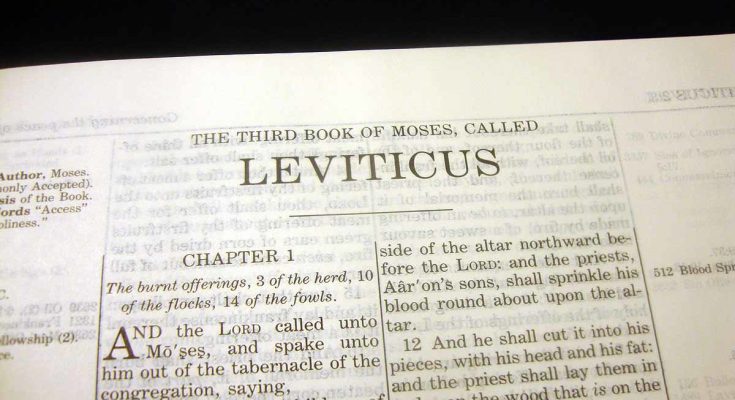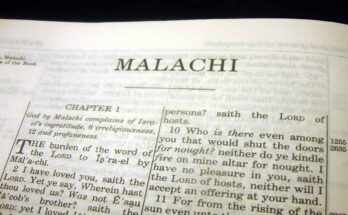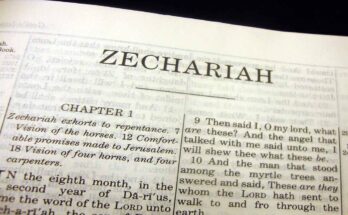Leviticus: The Heart of Old Testament Worship
In the book of Leviticus, God provided specific directions for the kind of worship that would be pleasing to him. These instructions teach us about the nature of God and can help us develop a right attitude toward worship. Through the offerings, we learn of the seriousness of sin and the importance of bringing our sins to God for forgiveness.
God gave clear standards for living a holy life to the Israelites. They were to be separate and distinct from the pagan nations around them. In the same way, all believers should be separated from sin and dedicated to God. God still wants to remove sin from the lives of his people.
In Leviticus, sacrifices, priests, and the sacred Day of Atonement opened the way for the Israelites to come to God. God’s people were able to worship him with their lives. Thus we read of purity laws and rules for daily living concerning family responsibilities, sexual conduct, relationships, worldliness, and vows. These instructions involve one’s holy walk with God, and the patterns of spiritual living still apply today. Worship, therefore, has a horizontal aspect – that is, God is honored by our lives as we relate to others.
The final emphasis in Leviticus is celebration. The book gives instructions for the feasts. These were special, regular, and corporate occasions for remembering what God had done, giving thanks to him, and rededicating lives to his service. Our Christian traditions and holiday are different, but they are necessary ingredients of worship. We too need special days of worship and celebration with our brothers and sisters to remember God’s goodness in our lives.
As you read Leviticus, rededicate yourself to holiness, worshiping God in private confession, public service, and group celebration.
Writer of Leviticus
Most conservative Bible students acknowledge Moses as the author of Leviticus, probably about 1440 B.C. But some scholars insist the book was pulled together from many different sources by an unknown editor several centuries after Moses’ death. This theory overlooks the dozens of instances in Leviticus where God spoke directly to Moses and Moses wrote down His instructions to be passed along to the people.
In essence, the debate surrounding the authorship of Leviticus remains a topic of interest among scholars and theologians. Nevertheless, for conservative Bible students and those seeking a deeper understanding of the Bible’s foundational teachings, the belief in Moses as the author, faithfully transcribing God’s instructions, continues to resonate as a fundamental aspect of their faith. This perspective not only underscores the divine authority of the book but also affirms the importance of these ancient laws and regulations in the context of Christian faith and theology.
Theological Contribution of Leviticus
The book of Leviticus is important because of its clear teachings on three vital spiritual truths: atonement, sacrifice, and holiness. Without the background of these concepts in Leviticus, we could not understand their later fulfillment in the life and ministry of Jesus.
First and foremost, Leviticus emphasizes the concept of atonement. Atonement, as articulated in Leviticus through various rituals and offerings, underscores the need for reconciliation between a holy God and fallen humanity. It teaches that sin creates a separation between God and His people, and atonement serves as the means by which this breach is repaired. This profound principle of atonement finds its ultimate realization in the sacrificial death of Jesus on the cross, where His blood becomes the perfect atonement for the sins of humanity, reconciling believers with God.
Leviticus serves as a theological cornerstone, illuminating critical spiritual truths of atonement, sacrifice, and holiness. Its teachings lay the groundwork for a deeper comprehension of their fulfillment in Jesus Christ, making Leviticus an invaluable part of the Christian biblical canon and an essential guide for understanding the redemptive work of God throughout history.
Special Consideration
Leviticus indeed places significant emphasis on rituals involving the blood of bulls and goats as part of its sacrificial system. However, it is crucial to recognize that these ancient practices, while central to Levitical worship, were inherently limited in their ability to provide lasting forgiveness of sins. As the book of Hebrews aptly describes, these rituals served as “a shadow of the good things to come” (Hebrews 10:1), casting a prophetic silhouette of God’s grand plan for redemption.
In the Old Testament, the repetitive nature of these sacrifices underscored the ongoing nature of sin and the temporary nature of their effectiveness. The blood of animals could cover sin symbolically but could not remove it permanently. Yet, embedded within Leviticus was a divine foreshadowing of God’s ultimate act of grace and love: the sacrifice of His Son, Jesus Christ.
The pivotal moment in human history occurred when Christ willingly offered Himself as the perfect and final sacrifice on the cross. His death fulfilled the types and shadows presented in Leviticus, as well as throughout the entire Old Testament. The verse from Hebrews 9:28 reminds us of this profound truth: “So Christ was offered once to bear the sins of many.” Through His atoning sacrifice, Jesus bore the weight of humanity’s sin, offering true and eternal forgiveness for all who would believe in Him.
Therefore, while the rituals involving bulls and goats in Leviticus had their place in the ancient worship of Israel, they ultimately pointed forward to the redemptive work of Christ. His sacrifice stands as the culmination of God’s plan for the forgiveness of sins, making Leviticus not merely a historical record of religious practices but a powerful testament to God’s overarching plan of salvation through His Son, Jesus Christ. It is in this profound context that we find the special consideration and lasting significance of the book of Leviticus in the Christian faith.
Click here to print or download the Scripture outline “Leviticus – Third Book of Moses“




